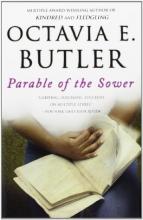Octavia Butler: Parable of the Sower

The Parable of the Sower is set in a dystopian future where climate change has made food, water, and energy prohibitively expensive and has worsened poverty and wealth imbalances. The protagonist grew up in a tenuously middle class gated community and the book features her struggle to survive.
One thing that I like about the book is that it puts a face on the environment. A lot of people think of environmental problems as very abstract and distant. I have heard some people that have dealt with injustice and seen horrible things happen in their community say that they just don't care about the environment because it isn't as important as the problems that are directly affecting them. The Parable of the Sower shows one of the ways that social justice and environmental justice are interconnected. And it's not just that way in a dystopian future -- we've already seen extreme weather drive people out of their homes and cause massive food shortages. The book was written in 1993, before a lot of people were thinking about global warming, but it does the problem justice.
A lot of privileged people, myself included at times, can have a hard time empathizing with people of color and other minorities when they talk about their daily struggles. I don't worry about being sexually harassed. I don't worry about being shot by police or by bigots. I don't worry about being "randomly" selected for extra screening at an airport. I don't worry about a drug addict breaking into and ruining my home. When someone like me hears a story or a statistic about injustices like those, they can seem strange because it's different from the experiences that people like me have. One of the freedoms that comes from writing in a dystopian setting is that those issues are more approachable. The world as a whole is strange, so what's a couple more strange things? But despite the slightly strange setting, many of the challenges outlined in the book are ones that people today go through all the time.
If you want to read a book about community, change, identity, and injustice, check out Parable of the Sower!



